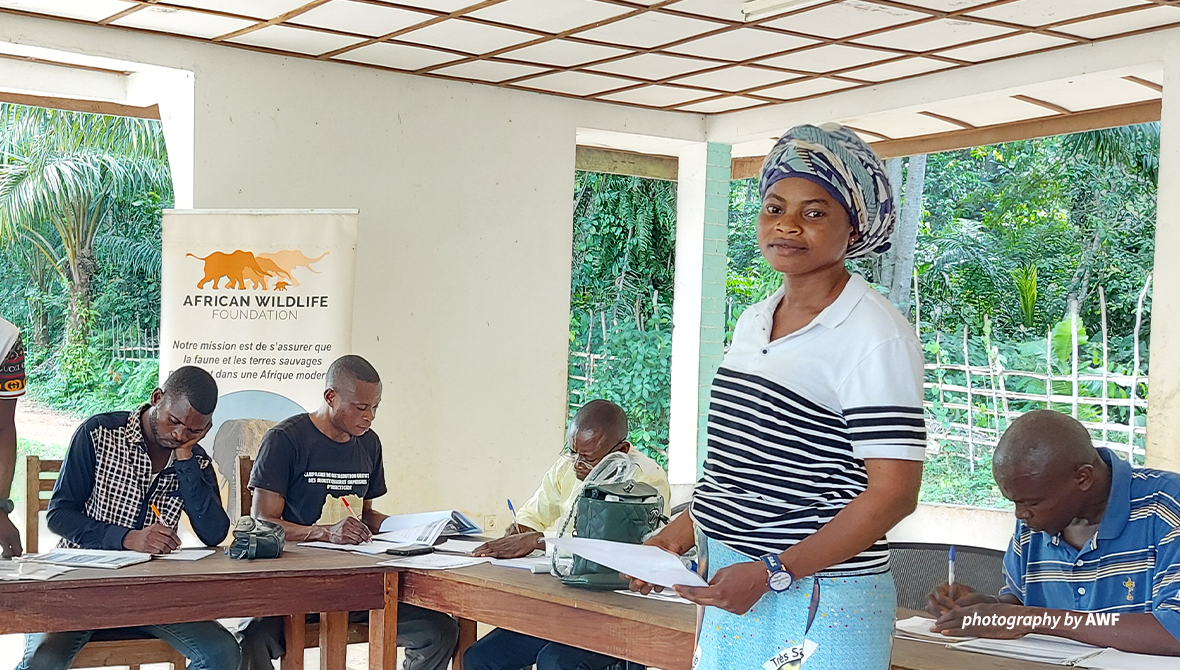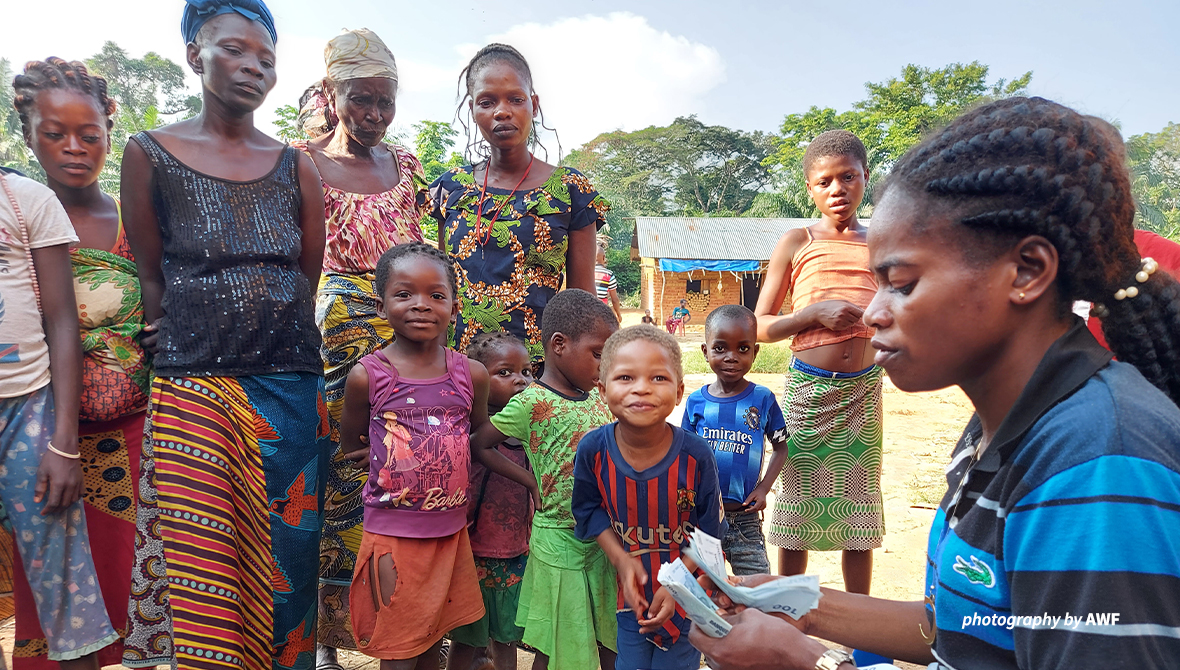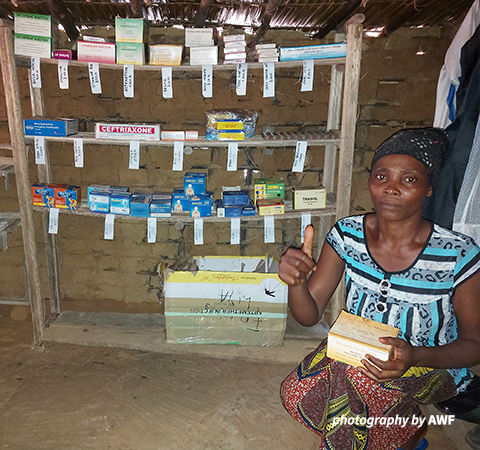Community enterprises to reduce pressure on the Lomako Yokokala Wildlife Reserve

AWF recruited business mentors for community training
Bordering the Lomako forest, in the north-western region of the Democratic Republic of Congo, is a protected area straddling the provinces of Equateur, Tshuapa, and Mongala, created to protect ecosystems. Deep in the equatorial rainforest between the Lomako and Yokokala rivers, tributaries of the Maringa and Lopori in the Lolonga watershed, is home to several species, including bonobos, forest elephants, Congolese peacocks, and Bongo antelopes.
With an estimated surface area of 362,500 hectares, this protected area is subject to four main pressures: poaching; logging; illegal occupation by Kitawalists, a religious group whose followers claim ownership of the reserve; and illegal fishing. These pressures are compounded by threats that keep the Lomako Yokokala Faunal Reserve (RFLY) in IUCN category II, namely logging, population growth, and the possible effects of climate change.
In light of the above, the African Wildlife Foundation strongly believes that to secure the RFLY's flora and fauna, we need to step up the fight against poaching without neglecting community development, as the biggest challenges facing the reserve are actually man-made.
The Institut Congolais pour la Conservation de la Nature (ICCN) is working with technical and financial partners to turn the legislator's vision of nature conservation into reality. This is where the "Bonobo conservation and Community empowerment in the Lomako - Yokokala Faunal Reserve (RFLY)" project finds its justification, in an attempt both to raise awareness among the local population of the RFLY and provide sustainable alternatives to unsustainable hunting, said Gentil Kisangani, Site Manager of the RFLY.
"The activities implemented by AWF in Lomako are based on four interdependent pillars: combating poaching, strengthening wildlife law enforcement, promoting human rights, and empowering communities," explains Idriss Ayaya, technical advisor in Lomako. “We are providing technical and financial support to the Institut Congolais pour la Conservation de la Nature (ICCN) to improve site management, increase the level of protection, and reduce the pressure exerted by human activities on the site," he continues.
>>Read about how eco-guards are inspiring youth to answer the call
Support in the form of training and the provision of equipment such as camera traps to the eco-guards has enabled them to collect data with precision and to use cutting-edge tools to record fauna and flora indices correctly.
"It's not only difficult, but also very early to talk about zero poaching, although it happens that most of our patrols result in no poacher arrests and no apprehension of animal traps," admits Gentil Kisangani, site manager of the Lomako Yokokala Wildlife Reserve. Nevertheless, he clarifies, nodding his head up and down in a sign of persuasion, "I admit that with the decrease in human pressure on wildlife, we are seeing an increase in bonobo populations and other flagship species of the region such as forest elephants. Keeping up this pace, the spotlight will soon be on the RFLY for its biological diversity, paving the way for tourism in this extraordinary corner of the DRC."
The second pillar of this project, law enforcement, involves raising awareness of nature conservation laws among local authorities, students, the judiciary, and political-administrative bodies, with particular emphasis on the rights and duties of both parties, not forgetting the transfer of poachers and assistance to ICCN curators in the event of legal proceedings. As a result of these campaigns, some poachers have given up their hunting weapons in favor of nature conservation.
Joe Kassongo, Senior Legal Officer, explains that AWF also organizes a series of training courses on legal assistance and wildlife prosecutions for eco-guards and, more specifically, Judicial Police Officers, to enable them to master the legislative framework relating to wildlife crime and improve their practical skills, particularly in the responsible management of evidence to reduce the rate of impunity for wildlife offenses.
"By choosing this rights-based conservation approach as our compass or rudder, AWF is fully committed to respecting, protecting, and promoting human rights in all its initiatives and for all its beneficiaries, regardless of their ethnic group, gender, race, sexual orientation, age, or social class," he hammers, banging his fist lightly on his office table.

Micro-business grants enhance community livelihoods
The community development AWF promotes in the Lomako Yokokala Wildlife Reserve aims to improve the livelihoods of communities living both inside and around the reserve. With technical support from Village Enterprise, AWF selects households identified as the poorest and organizes them into micro-enterprise groups to train them in entrepreneurship and savings to improve their living conditions and reduce the human footprint on biodiversity.
This approach involves subsidizing the business groups to the tune of 200 USD, supporting their activities through coaching by business mentors, and quarterly monitoring to assess the progress and scope of the results achieved.
At the very start of the project, a baseline survey was conducted to identify community groups close to the reserve, where poaching levels are high. It was from these groups that the beneficiary villages were selected.
Indeed, studies carried out in this landscape have shown that the poorest people are those whose survival depends entirely on natural resources. This is why socio-anthropological surveys are carried out beforehand to determine the standard of living of the households before triggering the process of empowering local communities. Following these surveys, AWF recruited business mentors, who were in turn trained to form Business Owners, or Business Groups.
"The criteria established were aimed at identifying extremely poor households whose indicators were type of housing, no schooling for children, very difficult access to medical care, food difficult to find once a day; poor households (non-decent housing, almost no schooling for children, very difficult medical care, difficult to eat); moderately well-off households (regular salary, access to food, easy schooling for children, access to medical care, presence of solar panels, bicycle transport); and well-off households (concrete construction for housing, motorcycle transport, easy access to food, schooling for all children and easy access to medical care, use of solar panels)," explains Idriss Ayaya.
“From 2021 to date, we have financed a total of 240 micro-businesses to the tune of USD 200 in the Lomako and Duale sectors, most of which are still running smoothly and making progress," he adds, smiling with satisfaction.

The grants kickstarted a community mobile pharmacy
Business Groups are formed by groups of three business owners, with each member freely joining the group of their choice based on affinities within the village. It is after the formation of these groups that the Business Savings Group (BSG) is formed, which is a grouping of five Business Groups (BGs) to save money once a week from the profits of their businesses. The BSG is an informal way of materializing and maintaining structured training modules on business skills, financial education, and savings for members of the local community.
The beneficiaries of these grants attest to the change in their way of life. As Claude Bossio testifies, before AWF came along with this initiative, he lived solely from hunting and struggled to feed his family daily. Today, however, he says, "Our group has created a pharmacy, and the profits we share have enabled me to set up my own mobile pharmacy to bring medicines to people who live far away in the forest. I'm no longer dependent on the fruitfulness of the forest, because with my money, I can now buy everything my family needs."
In addition to improving living conditions, this approach has also helped to enhance the status of women in the Mongo community. "We used to be considered only as universal receivers, in that we received everything from our husbands, but today we are happy to contribute financially to the running of the household," says Lundi Ifili with pride.
“We've got better things to do now," she continues. "Intermediating with poachers by buying bushmeat for resale is no longer an option for us, thanks to the African Wildlife Foundation.”
The result of all these activities is that AWF is banking on the reconversion of "poacher" hunters into income-generating entrepreneurs to reduce the poaching rate—because if they're busy running their own businesses, they won't have time to prey on natural resources.
"We don't conserve for the sake of conserving; we conserve for people. That's why it's more than encouraging to see that conservation is changing the lives of local communities, even slightly," says Antoine Tabu.
>>DRC's Bili-Uele has potential to help fight the climate battle